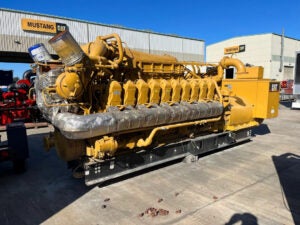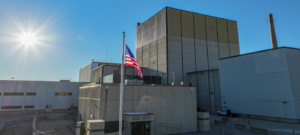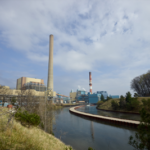In a Dec. 14 filing with the U.S. District Court for the Eastern District of Missouri, Ameren Missouri announced its intent to retire two 600-MW units at the Rush Island Energy Center 15 years earlier than previously planned due to “changed circumstances since the Remedy Ruling.”
The court’s remedy ruling, delivered on Sept. 30, 2019, requires Ameren to obtain a Prevention of Significant Deterioration (PSD) permit and install flue gas desulfurization (FGD) technology for emissions control at Rush Island. The ruling requires the plant to achieve a sulfur dioxide (SO2) emissions limit of 0.05 lb SO2/MMBtu or less on a 30-day rolling average. The judgment set a compliance deadline of March 30, 2024.
Ameren said retiring Rush Island early will have a “much more beneficial environmental impact, on a far shorter timeframe,” than installing wet FGD technology and continuing operations. However, the company said retiring the 1.2-GW facility is not a simple matter. “Potential grid stability and reliability impacts and other downstream effects must be evaluated, and those issues that are identified must be addressed,” it said.
The Midcontinent Independent System Operator (MISO) must review and approve the early retirement, which will involve an assessment of reliability impacts. Ameren reported that MISO’s review process for Rush Island’s early retirement “is already ongoing, and the results of MISO’s initial assessment are expected in mid-January 2022.”
Rush Island is the third-largest energy center operated by Ameren Missouri. The plant—located in Jefferson County near Festus, Missouri—began operation in 1976. Ameren claims it is “one of the most efficient energy centers in the Midwest and the country.” Over the past five years, the company says it has ranked in the top 10% among peers on a cost-per-MWh basis.
In September 2020, Ameren established a clean energy goal of net-zero carbon emissions by 2050 across all of its operations in Missouri and Illinois. The company also established interim carbon reduction goals of 50% by 2030 and 85% by 2040, based on 2005 levels. Additionally, it established a target of adding 5,400 MW of new renewable wind and solar generation resources to its generation portfolio by 2040, and advanced the retirement of two of its four coal-fired energy centers, beginning with the planned retirement of its 827-MW Meramec plant in 2022.
In the court filing yesterday, Ameren said that it is in the best interests of both customers and other stakeholders to retire Rush Island rather than install an FGD and continue operating the plant. “Changed circumstances driving the determination to retire Rush Island include changed forecasts in commodity (natural gas) pricing; the likelihood of future regulation of carbon emissions through a carbon ‘price;’ recent legislative enactments of the Missouri General Assembly; and an increased emphasis on environmental, social, and governance considerations by a wide range of stakeholders,” the company said.
In Ameren’s most recent Integrated Resource Plan (IRP), filed with the Missouri Public Service Commission in 2020, both units at the Rush Island Energy Center were slated for retirement by the end of 2039. While the precise timing of retirement will now be driven by MISO’s forthcoming reliability assessment, Ameren said it would close Rush Island no later than the March 30, 2024, compliance deadline established by the court. However, the company pointed to a couple of system reliability concerns that could prolong operation in the meantime.
The first reliability issue involves the regulation of voltage levels on the transmission grid in the St. Louis metropolitan area, an issue that the company said is particularly important during the air-conditioning season. Rush Island provides voltage support to the grid as a transient voltage recovery (TVR) resource that can help absorb and smooth out sudden voltage spikes that are caused by random transient events that impact the transmission grid. It is possible to install other devices to provide TVR support, but MISO could require such devices to be online before it allows Rush Island to be retired.
The second reliability concern involves grid stability during winter months. Ameren said reliability standards set by the North American Electric Reliability Corp. (NERC) require “more robust generating capacity be made available during ‘local forecasted cold weather.’ ” In order to mitigate the risk to the St. Louis metropolitan area from an extreme winter event, Ameren said it is prudent to operate Rush Island during the winter months (December–February) “to support the grid and to ensure that the units are available to respond instantaneously, should MISO issue a reliability directive to available generators.”
If TVR resources must be added to the grid prior to Rush Island’s retirement, Ameren said the projects would cost about $90 million and could take up to 30 months to complete once formally approved by MISO.
—Aaron Larson is POWER’s executive editor (@AaronL_Power, @POWERmagazine).










